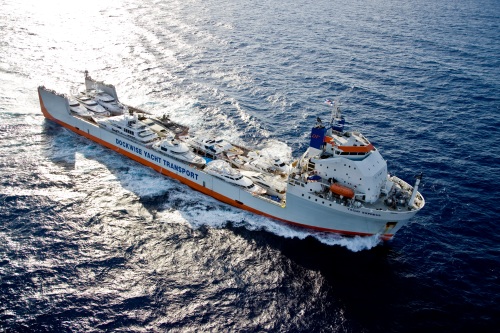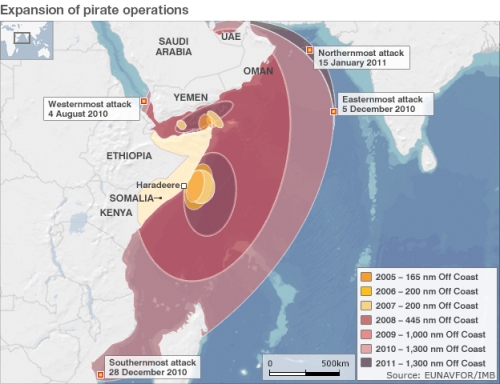Global Piracy Report Released
Both the commercial maritime world and the yachting cruiser are on high alert for piracy in the Indian Ocean after the International Chamber of Commerce (ICC) International Maritime Bureau’s (IMB) global piracy report was released last week.

Map showing the location of the Gulf of Aden, located between Yemen and Somalia. Nearby bodies of water include the Indian Ocean, Red Sea, Arabian Sea, and the Bab-el-Mandeb strait. By Norman Einstein
No Surprise
The report revealed that there has been a sharp rise in piracy world-wide, driven by a surge in piracy off the coast of Somalia, where 97 attacks were recorded in the first quarter of 2011, up from 35 in the same period last year. Violence has also increased worldwide in the first quarter of 2011; 18 vessels were hijacked, 344 crew members were taken hostage, and six were kidnapped, IMB reported. A further 45 vessels were boarded, and 45 more reported being fired upon.
‘Figures for piracy and armed robbery at sea in the past three months are higher than we’ve ever recorded in the first quarter of any past year,’ said Pottengal Mukundan, Director of IMB, whose Piracy Reporting Centre (PRC) has monitored piracy worldwide since 1991.
Still, only five of that total have involved yachts or other cruising vessels, up from two during the same time frame in 2008. However, Cyrus Mody, the organization’s manager, says the figures for yachts are incomplete, and are simply too small to make reliable comparisons. The group maintains a piracy reporting center in Kuala Lumpur, Malaysia.
IMB’s Piracy Reporting Centre is the only manned centre to receive reports of pirate attacks 24 hours a day from across the globe. IMB strongly urges all shipmasters and owners to report all actual, attempted and suspected piracy and armed robbery incidents to the IMB Piracy Reporting Centre.
Immediate Action Needed to Stop Piracy Off Somalia
May 26, 2011. In a call for immediate action on piracy, the International Chamber of Commerce (ICC) urged governments to take action against the increasing number of pirate attacks occurring off the Somali coast. The Call for Action was launched at the annual International Transport Forum taking place in Leipzig, Germany from 25-27 May.
Despite measures taken by the United Nations Security Council and the presence of naval units in the area of the Gulf of Aden, pirates continue to strike. More and more commercial shipowners have had to resort to using private security firms to protect their seafarers and ships.
In 2010, the One Earth Foundation estimated the economic cost of piracy on the supply chain to be between US$7-12 billion.
“This is of great concern to any industry having to navigate through the Gulf of Aden to deliver goods by water,” ICC said.
Prepared by the ICC Commission on Transport and Logistics, the call for action said: “As the World Business Organization, ICC urges governments to recognize that piracy, in addition to its effect on the safety of seafarers, has an important financial impact on global trade and shipping, and furthermore poses increased threat on the stability and security of energy supply lines not only for major industrial nations.”
ICC called on governments to improve the rules of engagement given to the navies present in the area, and refocus the efforts of the UN and other international bodies to ensure that pirates are brought to justice and that required institutions in central Somalia are established to maintain economic and social standards.
Together with shipowners and trade associations around the world, over 20 CEOs from key shipping and trading companies have endorsed the ICC Call for Action on Piracy.
Help is coming – but slowly
International organizations are urging governments to enforce maritime laws more aggressively. The U.S. Navy and Coast Guard have been training some third world maritime forces in how to deal with attacks against yachts. And companies are adapting new technology – such as drone aircraft – that might someday help.
Cruisers Have SSCA In Their Corner
In the wake of the murder of four Americans aboard the sailing vessel Quest, the Seven Seas Cruising Association has released a statement pushing for a “Call to Action” by the U.S. and other world leaders to stop piracy on the seas.
The statement outlines a number of steps that should be taken to stop the growth of piracy in both Somalia and other dangerous areas of the world. Perhaps the most controversial is the recommendation that nations of the world execute an agreement “to immediately stop all current and future payment of ransoms to pirates for the release of individuals or vessels, and publish this fact far and wide.”
The rationale:
This is a particularly painful, yet absolutely vital step. It is highly likely that ruthless and desperate pirates will test our will and resolve in this matter, and they have stated that they will kill hostages if rescue attempts are made or ransoms are not paid. While we deeply regret any loss of life, more ransom money paid means that even more lives will be lost, and the pirates will grow ever stronger. It is absolutely necessary to break the current business model where piracy provides a fast path to great wealth. Ransom money equals increased piracy, escalating costs, more hostages and greater loss of life.
Other recommendations include:
- Implement a policy to quickly and aggressively rescue hostages from pirate control.
- Immediately take whatever actions are necessary to protect the lives and vessels, both commercial and private, which are currently vulnerable to pirate attacks as they attempt to reach the Red Sea and the Suez Canal.
- Work through the United Nations to establish a multi-national naval quarantine of the Somali coast that forbids armaments aboard Somali vessels, authorizes the boarding and search of any vessel operating in the quarantined area and authorizes the seizure of any armaments found on Somali vessels.
- Focus anti-piracy efforts on the sources of piracy.
We strongly recommend you read and share this statement: http://ssca.org/downloads/SSCA_Call_to_Action_2_Mar_11.pdf. Let us know what you think of it in the comments.
What You Can Do
The IMB’s Mody and other experts point to several precautions that boaters can take to minimize the risks that they’ll encounter pirates on a circumnavigation or extended passage. Even little precautions can make a big difference.
1. Route your cruise carefully to avoid the most pirate-infested waters whenever possible. The IMB and several other groups list specific areas where piracy occurs most often. Besides Somalia, the waters off Venezuela top the list, along with Colombia, much of Central America, parts of the Caribbean, the Cape Verde islands, the Philippines, Eastern Malaysia and the reef-laden Malacca Strait, which links the Indian Ocean and Pacific Ocean. The State Department’s website also contains a list of warnings. about piracy.
2. Do your research! Learn as much as you can about pirates and how they operate. Check out the list below for a list of websites on Piracy expressly for cruisers.
3. Before you start out, make sure that you and your crew have a plan on how to deal with piracy attacks so that no one makes a rash move that could endanger lives. This includes knowing where emergency equipment is, how to get help and how to respond if you’re boarded. (Most experts advise crews to go along with attackers rather than fight.)
4. File a Float Plan with friends and relatives. Some “experts” recommend filing that with local governments, but in my experience local governments can be corrupt, especially in poorer countries. I’ve personally known cruisers who were set up by local officials in Columbia, Mexico and Central America.
5. Compile a list of telephone numbers and radio channels you’ll need to contact local authorities and, in some cases, let them know in advance when you’ll be transiting and what route you plan to take.
6. And Most Importantly, try to arrange to go in convoys with other boats when you sail through pirate-infested waters, and develop a plan for communicating with one another, getting help and what to do when your convoy is attacked. To make a convoy work, you’ll have to team up with boats that can make the same speed that your boat can, so you can all stick together. Use AIS to call one another rather than hailing over the VHF where everyone can hear you.
7. Sail at night. Many authorities suggest that you sail through pirate-infested waters at night – preferably when it’s cloudy and there’s no moon to make you easily visible. Turn off all lights – both interior lights and running lights – so it’s harder for pirate crews to see you (and keep a careful watch for traffic). Keep your engine noise to a minimum. And shut down unnecessary electronic devices.
Set a lookout at all times – even when you’re at anchor – and assign someone to monitor VHF-FM and single-sideband radios for warnings of pirate activity. Pirates usually use speedboats and frequently attack in early morning or late afternoon when they can use the sun to their advantage. If you have a sailboat or a vessel with low freeboard, you’re an especially inviting target.
Pirates don’t wear distinguishing clothing, but there are some signs and characteristics that should make you wary. Attacking vessels are usually small skiffs or speedboats, carrying two or three crew members.
Rule of Thumb: If you don’t see nets in or around the boat and sea birds aren’t flying around, they aren’t fishermen.

Image courtesy of icc-ccs.org
Piracy Resources:
Seven Seas Cruising Association
www.ssca.org
Noonsite – Piracy
www.noonsite.com
Caribbean Safety & Security Net (CSSN)
http://www.safetyandsecuritynet.com/
Yacht Piracy (Klaus Hympendahl)
http://www.yachtpiracy.org/en/dangerous_regions.htm
The International Sailing Federation (ISAF) – Piracy Reports
http://www.sailing.org/1382.php
Live Piracy Map from ICC
Live Piracy Map Link
Note: The main aim of the PRC is to raise awareness within the shipping industry, which includes the shipmaster, ship-owner, insurance companies, traders, etc, of the areas of high risk associated with piratical attacks or specific ports and anchorages associated with armed robberies on board ships. This site is not directed towards piracy against private yachts.
IMB Piracy Reporting Centre
If you wish to report an piratical incident or armed robbery please contact the 24-hour Piracy Reporting Centre:
Tel: + 60 3 2078 5763
Fax: + 60 3 2078 5769
Telex: MA34199 IMBPCI
E-mail: imbk l@ icc-ccs.org /attrpiracy @ icc-ccs.org
24 Hours Anti Piracy HELPLINE Tel: + 60 3 2031 0014
Please Stay Safe Out There and Fairwinds!
Read Full Post »















